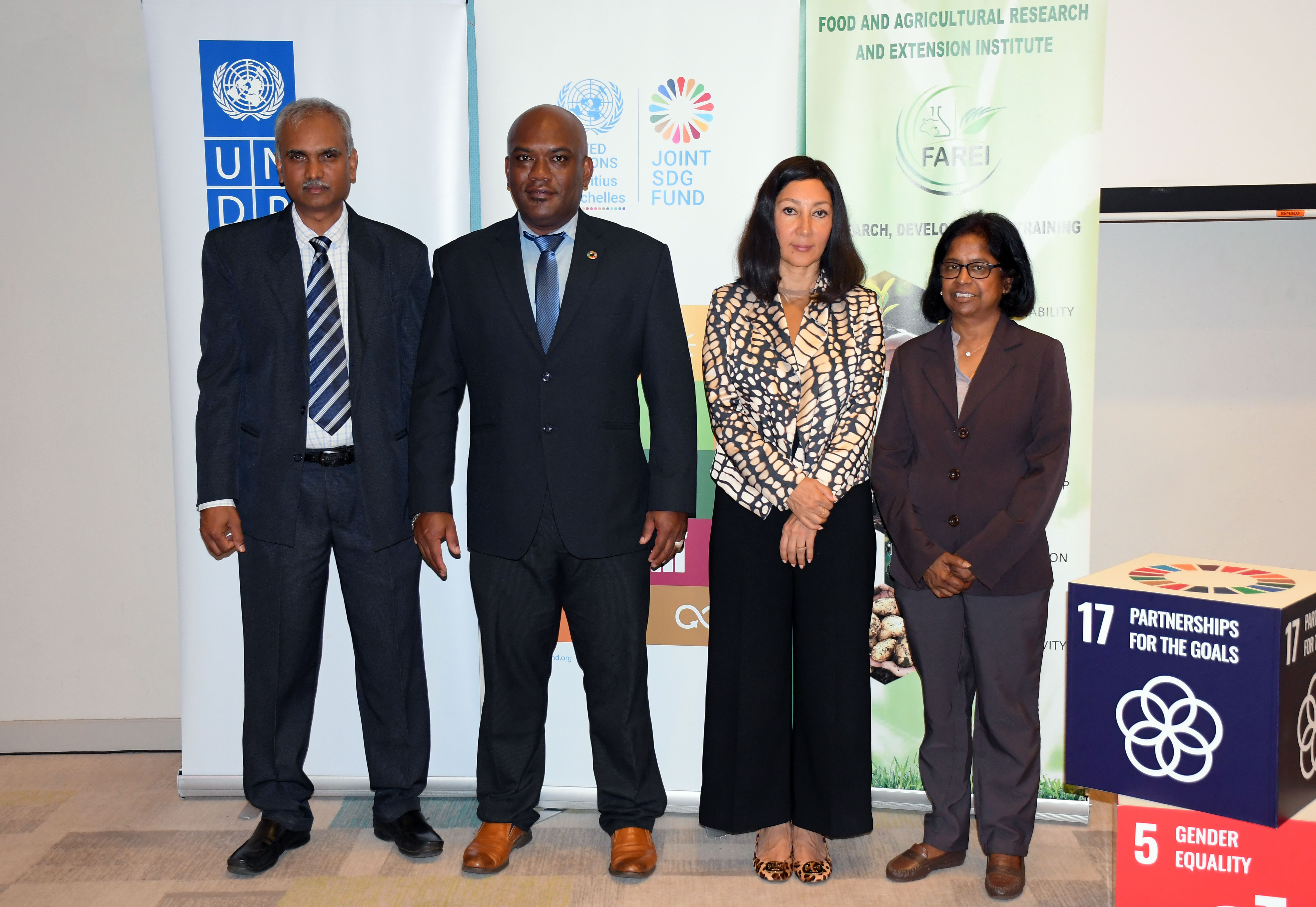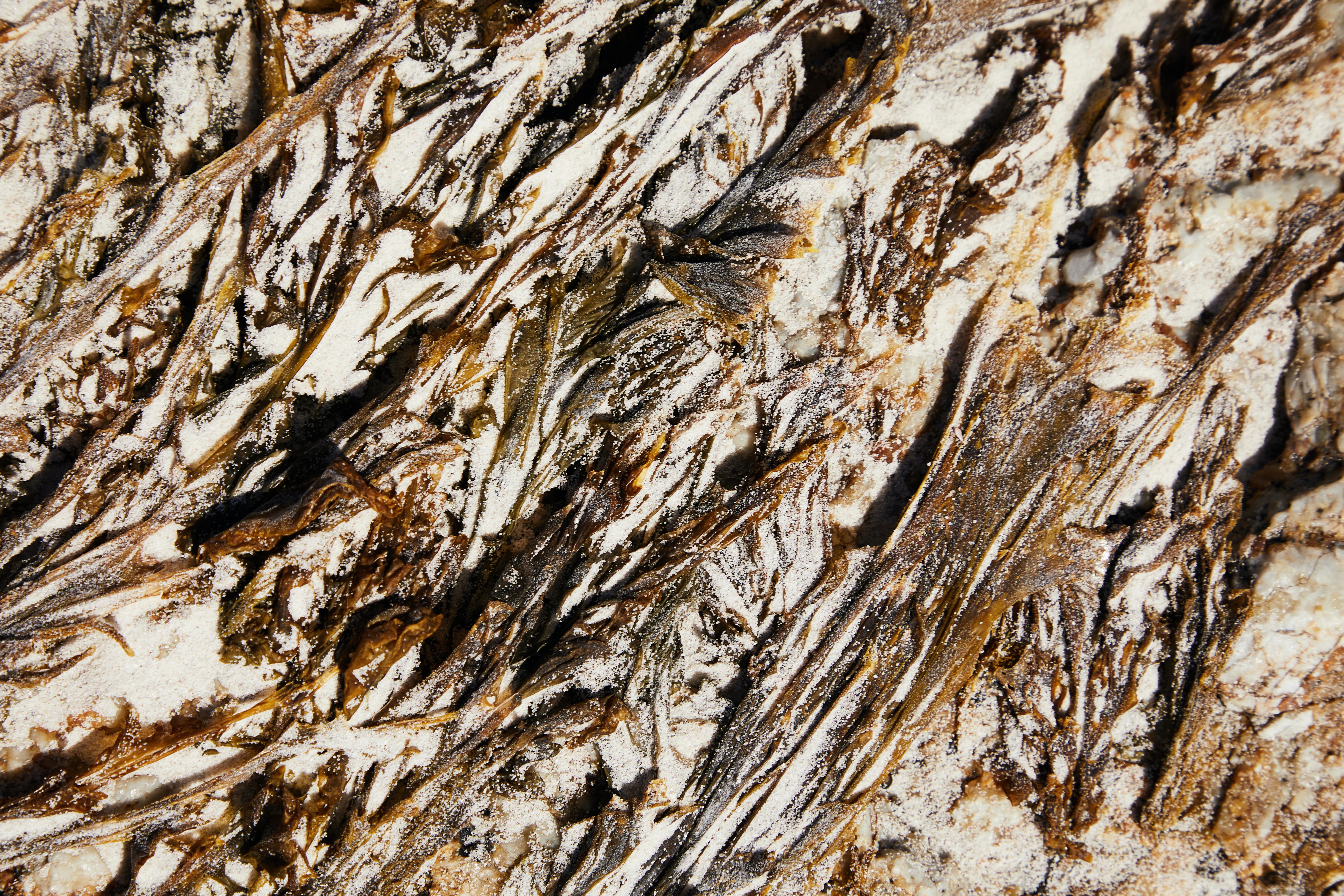Unlocking the Potential of Seaweed Bio-Fertilisers in Mauritius: A Path to Resilient Food Systems
September 22, 2023

Dr. P. Sookar, Assistant Director, Agricultural Services and officer-in Charge for the Crop and Agri-Food sector; Jean-Lindsay Azie UNDP Environment Unit Team Leader; Her Excellency Lisa Singh, UN Resident Coordinator for Mauritius and Seychelles, and Mrs. M. Seenavassen Pillay, acting Chief Executive Officer of FAREI.
A dissemination workshop was held in Ebène yesterday 21 September 2023 to share the latest findings on the potential use of seaweed as biofertilizers to build the resilience of food systems in Mauritius. This event, placed under the Joint Sustainable Development Goals (SDG) Fund, was organised by the UNDP in collaboration with the Food and Agricultural Research and Extension Institute of the Government of Mauritius (FAREI). Several stakeholders comprising representatives of the United Nations Resident Coordinator’s Office, officers from various ministries, and representatives from the University of Mauritius and the Mauritius Research and Innovation Council (MRIC) were present on this occasion.
Mauritius and Seychelles import 77% and 90% of their food requirements respectively. These figures highlight the urgency for both countries to consolidate their local food systems and build resilience in the face of global shocks that may disrupt their supply chains. In this context, the UN Resident Coordinator’s Office raised financial resources from the Joint SDG Fund to assist three UN agencies namely the Food and Agriculture Organisation, the United Nations Development Programme and UN Women in sustaining the efforts of the two countries to improve their agriculture sectors and food self-sufficiency.
Through the “Building the Resilience of Food Systems in Mauritius and Seychelles by Leveraging on Sustainable Agricultural Practices” project, the Joint SDG Funds have been used to promote the production of low-cost bio-fertilisers from seaweeds in Mauritius, while in Seychelles focus has been placed on climate-smart agriculture including aquaponics, hydroponics and sheltered farming to increase local food production.

Seaweed-composting carries the potential to boost local agriculture and also empower women in coastal communities who largely hail from low-income groups.
In her address to the audience, Her Excellency Ms. Lisa Singh, United Nations Resident Coordinator for Mauritius and Seychelles, underscored the timeliness of this workshop, coinciding with the SDG Summit during the General Assembly's high-level week. Ms. Singh emphasised the enduring presence of shocks and the critical importance of prioritizing food security, especially for a Small Island Developing State like Mauritius. She also highlighted the seaweed project's unique positioning to align with the SDG agenda, offering relevant solutions for Mauritius and its people. The United Nations Resident Coordinator concluded by stating that this gender-sensitive project embodies the UN's spirit of collaboration and integrated development, “unleashing the synergies and opportunities of working together and go more towards systems thinking which allows mobilizing expertise from various sectors.”
Mrs. M. Seenavassen Pillay, acting Chief Executive Officer of FAREI mentioned the importance to consider seaweed wastes as resources to boost the local agriculture sector which is reliant on imported chemical fertilisers. The CEO of FAREI went through the project's goals, which include analyzing seaweed fertiliser potential in Mauritius, identifying production barriers, and promoting knowledge sharing through study-tours. She also listed the project’s outcomes which comprised of: (i) assessing seaweed fertiliser potential, (ii) mapping the value chain from collection to utilization, (iii) providing economic and technical data, and (iv) offering recommendations while addressing barriers.
Dr. P. Sookar, Assistant Director, Agricultural Services and officer-in Charge for the Crop and Agri-Food sector delivered remarks on the behalf of the Minister of Agro-Industry and Food Security. He stressed on the need for innovative, eco-friendly solutions to ensure food security and protect Mauritius' ecosystems. He mentioned an upcoming legislation to set standards for compost and seaweed-based bio-fertilisers and called for collective efforts to make seaweed fertilisers a reality so as to advance Mauritius towards a sustainable agricultural future.
The way to a cost-effective exploitation of seaweed as a bio-fertiliser
The workshop also comprised several technical interventions from FAREI and the University of Mauritius, which provided interesting findings, notably the confirmation of the high value of seaweed compost for agricultural purposes; the availability of seaweed volume and variety throughout the year, and a pronounced enthusiasm from prospective beneficiaries to launch their own enterprise in seaweed composting.
Additional research and analysis have revealed that, despite challenges, including a lack of substantive financial support for seaweed composting, it is possible to establish cost-effective seaweed bio-fertiliser production in Mauritius. Creating a conducive environment for nurturing a value chain within this emerging agri-business sector requires the establishment of a well-defined regulatory framework and action plan. Additionally, there is a need to prioritize actions such as research, development strategies, innovation, and public awareness regarding the potential of seaweed. Furthermore, facilitating access to financing and enhancing capacity in the sector are vital steps to take to harness all the possibilities of seaweed-based products.
It was also observed that the seaweed-composting project carries the potential to empower women in coastal communities who largely hail from low-income groups. In this context, recommendations were made towards supporting the state via the Ministry of Gender Equality, Child Protection and Family Welfare and other relevant stakeholders to encourage women to be fully involved in and benefit from the sector.

 Locations
Locations